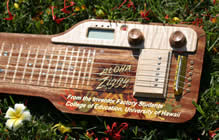The College of Education Curriculum Research & Development Group (CRDG) is teaching Oahu’s middle and high school students to develop and make products that are typically imported, but could potentially be exported from Hawai‘i. As part of a three-year National Science Foundation grant, The Invention Factory is currently designing and building professional quality, electric Hawaiian steel guitars using a combination of computer aided design (CAD) software, computer numerically controlled (CNC) machines, and ‘elbow grease.’
 In addition to designing and building the guitars, students learn what makes them work and how to play them. And, at a press conference on August 15th, they presented a custom designed guitar to Ziggy Marley (pictured).
In addition to designing and building the guitars, students learn what makes them work and how to play them. And, at a press conference on August 15th, they presented a custom designed guitar to Ziggy Marley (pictured).
Dr. Neil Scott, Co-Principal Investigator for the Invention Factory said, “This project is not just about making the guitars; rather, the guitars are a catalyst for developing knowledge, skills, and insights that make science, technology, engineering, and mathematics relevant for future career choices.” Scott adds that the guitars also help students understand the balance between mass manufacturing and quality workmanship. “The students spend about one day designing the body and other parts on a CAD system; six minutes cutting it out on a CNC machine; and three to four days sanding, polishing and assembling their creations to create a uniquely beautiful instrument.”
Through an extension to the grant, The Invention Factory has evolved into Makery Cloud, a collection of modern workshop facilities using Internet-based learning and collaboration resources. CRDG has paired with the COE’s Career and Technical Education to set up the Makery Cloud at the COE. Three charter schools on the Big Island have already been set up and linked to the central Makery Cloud, with other US Pacific Territories, such as American Samoa and Guam, joining soon.
Makery Cloud enables teachers and students in any of the remote locations to learn how to design and make products, such as guitars, as well as to design and make the actual CNC machines that fabricate the products. One group of students is currently designing and building a $7,000 CNC routing machine, which would normally cost $40,000. This machine will enable students to make a broad range of wooden and plastic products, including furniture and souvenirs, using local or native materials.
 COE researchers will train teachers at the remote sites to use CNC machines. To save costs and encourage cooperation, each of the charter schools is set up with different CNC capabilities – one for woodworking, one for metal working, and one for turning (lathing).
COE researchers will train teachers at the remote sites to use CNC machines. To save costs and encourage cooperation, each of the charter schools is set up with different CNC capabilities – one for woodworking, one for metal working, and one for turning (lathing).
By combining the almost obsolete wood shop class with cutting edge CNC technologies and web-based collaboration tools, Makery Cloud is creating a new foundation for individuals across the Pacific region to become the manufacturers and entrepreneurs of tomorrow.
September 15, 2009
Jennifer Parks
(808) 956-0416
